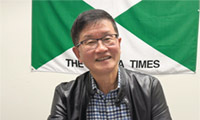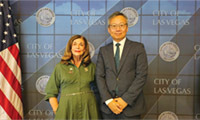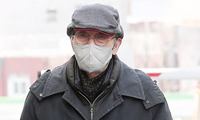One variety is intestinal, the worms that afflict countless children. In a hospital here in Angola, nurses pointed to a little girl named Marcelina, who they said was at risk of dying from anemia caused by worms and malnutrition. She had so many worms she was spitting them up.
The other kind of parasite afflicting Angolan children is the crooked official, often working with Western executives. It’s not a coincidence that Angola is a center for both kinds of parasites.
“Much of the health care budget gets stolen,” Rafael Marques de Morais, an investigative journalist in Angola, told me. “The biggest problem in this country is corruption.”
When officials pocket health care funds, Marques de Morais noted, children suffer. Likewise, doctors and nurses sometimes take medicines from their clinics and sell them in the markets. At the first street stall I went to, I found donated Novartis anti-malaria medicine for sale . even though it was marked “not for retail sale.”
What unsettles me is the Western role in this corruption. Western oil companies and banks work closely with Angolan officials, enabling the kleptocracy, and the United States and other governments mostly avert their eyes from the corruption, repression and humanitarian catastrophe.
A generation ago, the United States supported a brutal warlord, Jonas Savimbi, in Angola’s civil war. He lost. Now, because of oil interests, we have allied ourselves with the corrupt and autocratic winner, President Jose Eduardo dos Santos, in a way that also will also be remembered with embarrassment.
Secretary of State John Kerry visited for two days last year, and, in December, he hailed “the great dividends of our partnership with Angola.” He and other officials have enveloped Angola in a big hug.
“Publicly, the U.S. is mute, or at most tepid, when it comes to the crushing state repression,” noted Leslie Lefkow of Human Rights Watch.
Tom Burgis of The Financial Times has a powerful new book, “The Looting Machine,” asserting that firms, including Goldman Sachs and Carlyle Group, backed an oil company called Cobalt in investing in oil operations in which Angolan officials secretly held stakes worth staggering sums.
Likewise, American oil companies like ExxonMobil, Chevron and ConocoPhillips are active in Angola. Groups like the One Campaign have pushed to require international oil companies to disclose sums paid to governments so that the money can be tracked . increasing the chance that it makes it into state coffers and not private pockets. Europe and Canada are requiring their companies to make these disclosures.
But the American Petroleum Institute is lobbying hard to water down disclosure requirements. The oil industry apparently seeks to sustain an opaque system that has allowed the Angolan president’s family to earn billions even as the country ranks No. 1 worldwide in child mortality rates.
American executives argue that it’s naive to hold them to international standards when they’re competing with, say, Chinese companies, which excel at paying bribes. Chinese companies are everywhere in Angola; one Chinese executive estimated that 100,000 Chinese now work in the country. But, in this case, Europe and Canada are trying to raise standards. So let’s not be China!
The way to help children like Marcelina, or the 150,000 who die each year in Angola, is not just to hand out medicines. It’s to hold Angola’s leaders accountable so that they use oil money to buy deworming medicine and not $2,000-a-bottle Dom Perignon. It’s to support those brave Angolans like Marques de Morais who are trying to improve governance.
Marques de Morais has tracked $3 billion accumulated by President dos Santos’s daughter, the $13 million refurbishment of the presidential palace, the Lexus LX 570 luxury S.U.V.’s given to each member of Parliament . all at a time when children aren’t consistently getting five-cent deworming pills.
I’m honored to be in the same profession as Marques de Morais. He went on trial Tuesday for criminal defamation and could face years in prison; if the United States wants to signal that it cares about corruption, Secretary Kerry could tweet his support and the American ambassador could invite Marques de Morais to a very public lunch.
The last time Marques de Morais was imprisoned, in the 1990s, he said he was released only when the United States ambassador to the United Nations at the time, Richard Holbrooke, visited Angola and insisted on seeing Marques de Morais . in prison if necessary. Angola hurriedly freed him.
In other words, we have influence, if we’re willing to use it. And when children are spitting up worms and a country ranks No. 1 in child mortality worldwide, let’s exercise that influence rather than remaining complicit.
스마터리빙
more [ 건강]
[ 건강]이제 혈관 건강도 챙기자!
[현대해운]우리 눈에 보이지 않기 때문에 혈관 건강을 챙기는 것은 결코 쉽지 않은데요. 여러분은 혈관 건강을 유지하기 위해 어떤 노력을 하시나요?
 [ 건강]
[ 건강]내 몸이 건강해지는 과일궁합
 [ 라이프]
[ 라이프]벌레야 물럿거라! 천연 해충제 만들기
 [ 건강]
[ 건강]혈압 낮추는데 좋은 식품
[현대해운]혈관 건강은 주로 노화가 진행되면서 지켜야 할 문제라고 인식되어 왔습니다. 최근 생활 패턴과 식생활의 변화로 혈관의 노화 진행이 빨라지고
사람·사람들
more
[인터뷰] 멕시코 오지에 세운 ‘희망 진료소’… “관심과 행동이 등불”
멕시코 바하 캘리포니아의 작은 마을 ‘푼타 코로넷(Punta Colonet)’. LA에서 차로 7~8시간 정도 달려야 닿는 이곳에 한인 내과의…

김영완 총영사 LV 방문
김영완 LA 총영사는 지난 11일부터 13일까지 라스베가스(LV)를 방문, 시장 및 주지사실 산하 경제개발청, UNLV 호텔경영대학 등과 잇따…
어흥축제 국악경연대회 해외 참가자 특별 무대
2025 어흥축제가 우천으로 오는 12월12일로 연기된 가운데 이번 축제의 일환으로 예정됐던 미주 국악경연대회의 해외 참가팀 특별무대 행사가 …
[올림픽 골프] 3개 남가주 매장에서 ‘원스톱 골…
올림픽 골프가 추수감사절을 맞아 대규모 골프 용품 세일을 진행한다. 이번 세일은 골프 클럽, 골프백, 의류, 액세서리 등 다양한 골프 관련 제…
[한스전자] 인기 가전제품 최대 2,000달러 할…
한스전자가 연말을 맞아 삼성, LG, 딤채, 프리지데어 등 인기 가전제품을 대상으로 최대 2,000달러 대규모 할인 행사를 진행한다. 이번 행…
많이 본 기사
- 관광비자 수수료 인상 185달러서 4… 1
- 팽팽한 피부·부푼 입술… “워싱턴 대세 성형스타일은 ‘마가 여성’”
- 조현병 나아졌다고 방치하면?… 5년 내 80% 재발 가능성 높아
- 2,000달러 관세 배당금… 내년에 … 1
- 의회, ‘엡스타인 파일 공개 법안’ 가결…트럼프 서명만 남아
- 데이터센터 건설 열풍 속…미국 겨울철… 1
- 교황, 트럼프 이민정책 거듭 비판… “극도로 멸시적인 대우”
- 검찰 물갈이, 중앙지검장 박철우·반부패 주민철… “안정·쇄신”
- 슬기로운시니어생활 43회
- “화장실에서 꼭 확인해라”… ‘이런 모양’ 변 계속 나온다면 대장암일 수도
- 트럼프, 공화 장악력 약화… ‘셧다운 핵옵션·엡스타인’ 파열음
- 한인타운 ‘우후죽순’ 노점상들 버몬트… 3
- 의회가 공개 결정한 ‘엡스타인 파일’… 정·재계 새 뇌관 되나
- “트럼프 지지율 38%… ‘高물가·엡스타인’에 재집권 후 최저치”
- 한인 대형교회 전도사 113만불 횡령… 10
- ‘노재팬’ 나선 中 여행객들, 대신 우르르 한국행
- 채안 캘리포니아 주지사 후보 “시민이… 1
- “어, 우리 아기 아닌데?” 산후조리원서 신생아 바뀌어 산모 분통
- 캐런 배스 시장, 산불 피해 주민 주… 1
- 한인 버스기사 살해범, 중범 불체자였… 1
- “연말 항공여행 숨통 튀었다”… 항공편 감축 해제
- ‘엡스타인 논란’에 입장 돌변 트럼프 “문건 전부 공개하자”
- 갑상선암, 운동과 상관없다더니…10년만에 결과 뒤집혀
- 형제교회 ‘횡령 사역자’는 성환철 전도사...공동의회 통해 성 전도사 횡령금액과 방법 등 밝혀
- 아내 ‘냉동인간’ 만들더니 돌연 “혼자살기 적적해”…새 여친 맞은 남편 中서 논란
- ‘한채영 닮은꼴’ 28기 영숙 “반복되는 오해” 성형 시술 입 열었다
- [인터뷰] 멕시코 오지에 세운 ‘희망 진료소’… “관심과 행동이 등불”
- 하원, ‘엡스타인 파일 공개 법안’ 가결…공화당도 ‘찬성 몰표’
- 사우디 빈살만 “1조불 투자”…트럼프… 1
- 최현우, ‘13억’ 로또 1등 예언 적중에 고소당할 뻔..”당첨금 수령은 노코멘트”[돌싱포맨]
- 바이브코딩 넘어 바이브워킹…MS, 모든 업무 통합 에이전트 공개
- 램버트 前 부차관보 “내년 中서 北美회담하려면 러 협조 필요”
- 뉴욕증시, 엔비디아 실적 ‘D-1’ 기술주 또 팔자…동반 하락
- 트럼프, ‘7년만의 방미’ 사우디 빈살만에 오·만찬 ‘국빈급예우’
- [김스전기] 알뜰 샤핑의 성지… 풍성한 ‘반값+사은품’ 제공
- 연준, 내달 기준금리 0.25%p 내려야”
- [존청 변호사의 “경제·법률 핫이슈”] 세금 없는 평생 소득을 만드는 생명보험 활용법
- 트럼프 “엡스타인은 민주당 문제…파일공개법 통과시 서명할것”
- “첨단기술 노린 중국, 미국에 지난 … 1
- ‘쯔양 협박’ 구제역, 수감 중 방송 은퇴 “피해자들에 죄송”
- 도요타, 미국 내 하이브리드車 생산 확대… “9억 달러 규모 투자”
- 서예지, 가스라이팅→학폭 논란 후 복귀 준비 중..머리 산발에도 미소
- 회장선거(뉴저지한인회) 놓고 내분사태… 1
- ‘도반(道伴)’
- 버핏, 애플 팔고 구글 대규모 ‘베팅’
- 메타, 인스타·왓츠앱 인수 문제삼은 美정부 반독점 소송 승소
- 오늘도 해결사! 이강인 환상 크로스→이태석 A매치 데뷔골 쾅! 한국, 가나에 1-0 신승 ‘포트2 보인다’
- “워싱턴교협 50년, 다음세대에 방향 제시하는 좌표”
- [지평선] 외국어 공부와 장수
- OC 유일 대학 병원 ‘UCI 헬스’ 최고 수준 서비스
1/5지식톡

-
 테슬라 자동차 시트커버 장착
0
테슬라 자동차 시트커버 장착
0테슬라 시트커버, 사놓고 아직 못 씌우셨죠?장착이 생각보다 쉽지 않습니다.20년 경력 전문가에게 맡기세요 — 깔끔하고 딱 맞게 장착해드립니다!장착비용:앞좌석: $40뒷좌석: $60앞·뒷좌석 …
-
 식당용 부탄가스
0
식당용 부탄가스
0식당용 부탄가스 홀세일 합니다 로스앤젤레스 다운타운 픽업 가능 안녕 하세요?강아지 & 고양이 모든 애완동물 / 반려동물 식품 & 모든 애완동물/반려동물 관련 제품들 전문적으로 홀세일/취급하는 회사 입니다 100% …
-
 ACSL 국제 컴퓨터 과학 대회, …
0
ACSL 국제 컴퓨터 과학 대회, …
0웹사이트 : www.eduspot.co.kr 카카오톡 상담하기 : https://pf.kakao.com/_BEQWxb블로그 : https://blog.naver.com/eduspotmain안녕하세요, 에듀스팟입니다…
-
 바디프렌드 안마의자 창고 리퍼브 세…
0
바디프렌드 안마의자 창고 리퍼브 세…
0거의 새제품급 리퍼브 안마의자 대방출 한다고 합니다!8월 23일(토)…24일(일) 단 이틀!특가 판매가Famille: $500 ~ $1,000Falcon: $1,500 ~ $2,500픽업 & 배송직접 픽업 가능LA…
-
 바디프렌드 안마의자 창고 리퍼브 세…
0
바디프렌드 안마의자 창고 리퍼브 세…
0거의 새제품급 리퍼브 안마의자 대방출 한다고 합니다!8월 23일(토)…24일(일) 단 이틀!특가 판매가Famille: $500 ~ $1,000Falcon: $1,500 ~ $2,500픽업 & 배송직접 픽업 가능LA…
케이타운 1번가
오피니언
 노세희 부국장대우·사회부장
노세희 부국장대우·사회부장 대한은 다시 살아나는가
 민경훈 논설위원
민경훈 논설위원사자와 생쥐, 그리고 인간 이야기
 한형석 사회부 부장대우
한형석 사회부 부장대우 한인타운 교통 인프라 개선 기대
 박영실 시인·수필가
박영실 시인·수필가 [화요칼럼] 말의 위력
 양홍주 / 한국일보 논설위원
양홍주 / 한국일보 논설위원 [지평선] 외국어 공부와 장수
 이상국
이상국 ‘도반(道伴)’
 옥세철 논설위원
옥세철 논설위원러시아제국 부활의 꿈은 멀어져만 가고…

폭발 직전의 상황인가?
 메건 매카들 워싱턴포스트 칼럼니스트 / CNN ‘GPS’ 호스트
메건 매카들 워싱턴포스트 칼럼니스트 / CNN ‘GPS’ 호스트 [메건 매카들 칼럼] 지나간 시대의 낙관주의
1/3지사별 뉴스

‘네이버 플러스’호스피스 자원봉사자 31명 배출
뉴저지 팰리세이즈팍에 위치한 비영리단체‘네이버 플러스’(Neighbor Plus·이사장 양춘길 목사)가 말기암 환자와 그 가족들을 돌보는 제4…
회장선거(뉴저지한인회) 놓고 내분사태 ‘악화일로’

“워싱턴교협 50년, 다음세대에 방향 제시하는 좌표”
“구슬이 서 말이라도 꿰어야 보배라는 말이 있다. 구슬을 꿰어 보배를 만들어 낸 편찬위원회에 감사하고, 지난 50년간 그 구슬을 만들어낸 여러…
장학생 20명 선정…장학금 총 3만불

사우디 빈살만 “1조달러 투자”…7년만의 방미환대 트럼프에 선물
사우디아라비아가 18일 대미 투자액을 기존에 발표했던 6천억 달러(약 876조원)에서 1조 달러(약 1천460조원) 규모로 상향 조정하기로 했…
방한후 美입국했다 석연찮게 구금된 한인과학자, 4개월만에 석방

오늘 하루 이 창 열지 않음 닫기 


















































.png)


댓글 안에 당신의 성숙함도 담아 주세요.
'오늘의 한마디'는 기사에 대하여 자신의 생각을 말하고 남의 생각을 들으며 서로 다양한 의견을 나누는 공간입니다. 그러나 간혹 불건전한 내용을 올리시는 분들이 계셔서 건전한 인터넷문화 정착을 위해 아래와 같은 운영원칙을 적용합니다.
자체 모니터링을 통해 아래에 해당하는 내용이 포함된 댓글이 발견되면 예고없이 삭제 조치를 하겠습니다.
불건전한 댓글을 올리거나, 이름에 비속어 및 상대방의 불쾌감을 주는 단어를 사용, 유명인 또는 특정 일반인을 사칭하는 경우 이용에 대한 차단 제재를 받을 수 있습니다. 차단될 경우, 일주일간 댓글을 달수 없게 됩니다.
명예훼손, 개인정보 유출, 욕설 등 법률에 위반되는 댓글은 관계 법령에 의거 민형사상 처벌을 받을 수 있으니 이용에 주의를 부탁드립니다.
Close
x